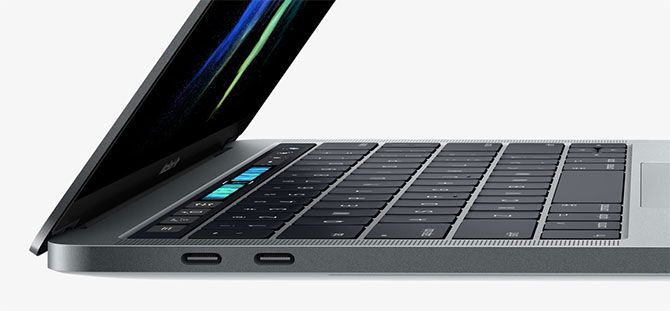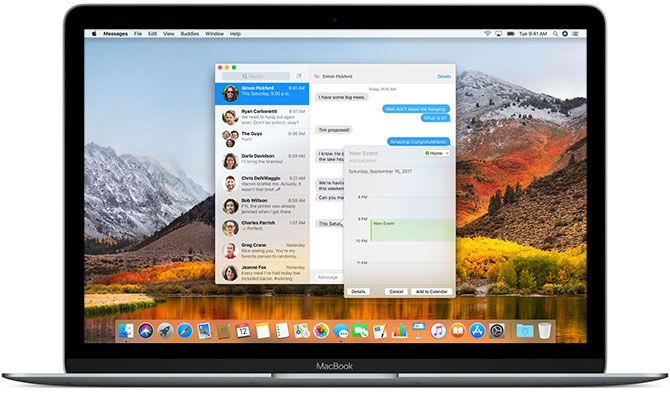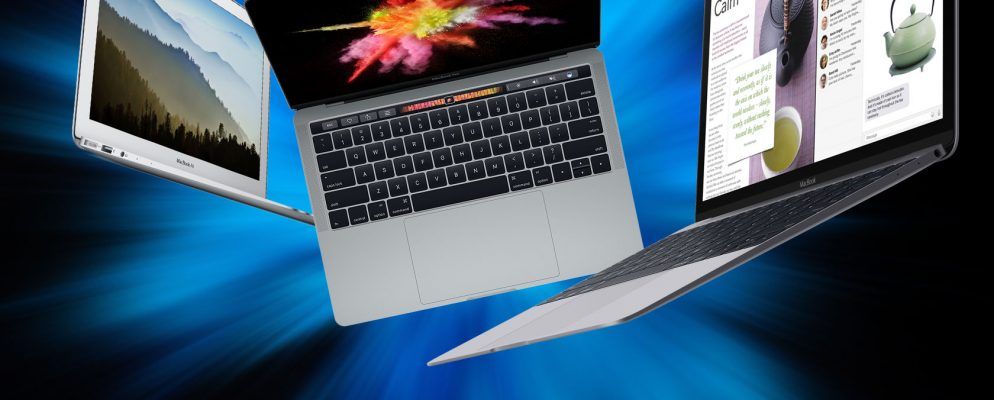Apple has streamlined its portable Mac offerings into two distinct laptops: the MacBook Air and the MacBook Pro.
For a few years, Apple attempted to replace the outdated MacBook Air with the generically-titled MacBook. This never quite took off, so Apple returned the MacBook Air to its former glory with new models. Both the Air and Pro deliver their own experiences, aimed at the needs of different users.
Which one is the right choice for you? Is it worth forking over more money for a better model, or should you save a few bucks by opting for the cheapest instead?
Understanding the Basics of MacBook Models

If you’re looking for a desktop Mac, you’ve got one clear choice: the iMac. You could save money by bringing your own monitor and opting for the Mac Mini, or opt to spend several grand on a souped-up iMac Pro or Mac Pro. For most of us, the iMac is good enough.
But when it comes to laptops, the situation is less clear-cut. Price points intersect, specs aren’t always clear, and you probably don’t need the most extravagant bells and whistles found on the flagship models.
Features Consistent Across MacBook Models
To start off, let’s take a look at what all MacBook models share. Whether you spend $999 or $2,999, your Mac will run macOS. That’s Apple’s desktop operating system (formerly called Mac OS X) and a large part of why many users remain loyal to Apple’s ecosystem.
Battery life is also great across the board, with all models rated for a minimum of 10 hours under optimal conditions. Apple’s battery estimates are generally fair, but the quoted figure depends on what you’re doing. Using first-party apps optimized for the hardware, like Safari, yields a longer runtime.
Most new Mac models score badly in terms of repairability and upgradeability. Gone are the days of the old MacBooks where you could remove the optical drive and replace it with an SSD. The newest laptops take a more disposable approach, with RAM that’s soldered to the motherboard and batteries glued in place.
Overall though, MacBook build quality is solid. Apple computers tend to keep on going, and its laptops are no exception. The aluminium unibody is not only a great heatsink, but also a sturdy chassis that can withstand some abuse. You’ll probably have dead pixels and an outdated processor long before your MacBook gives up the ghost.

In addition to these points, all new MacBook models feature:
- Solid state drive (SSD) storage: These are much faster than traditional hard drives, and more resilient to physical damage. Capacities start at 128GB and 256GB, depending on the model.
- Multi-touch trackpads: Enable navigating and controlling your computer with multi-touch gestures, like pinch-to-zoom and Apple’s trademark two-finger scroll.
- Backlit keyboards: With controls for turning the brightness up, down, and off.
- 802.11ac wireless: The latest in Wi-Fi standards, with attainable speeds of up to 1,300 Mbps.
- FaceTime HD camera and microphone: For FaceTime, Skype, and similar video calls.
- Headphone (stereo) port: Unlike the iPhone, every MacBook still comes with a 3.5mm headphone port.
All models feature some form of optional upgradeability when building your Mac on Apple’s website. The processor, RAM, SSD capacity, and graphics chip may be configurable, depending on the model. You can also apply AppleCare
AppleCare Warranty: What Are Your Options and Is It Worth It?
AppleCare Warranty: What Are Your Options and Is It Worth It?
AppleCare+ protects your Apple device, but is it worth the cost? Here’s what AppleCare+ offers and whether you should get it.
Read More
, the company’s aftermarket support package, to all models within 60 days of purchase.
Now, let’s take a look at each model individually and see how the differences stack up.
The Best MacBook for Most Users: MacBook Air

Price: From $1,099
The MacBook Air is one of Apple’s cheapest computers, period. It’s a great jumping-on point for new Mac owners, and it’s earned a well-deserved reputation for providing great value for money.
For years, the MacBook Air’s design remained similar to when it was first introduced in 2008, while Apple focused its efforts on the MacBook. That changed in 2018 when the MacBook Air reemerged. The shape is suggestive of the original MacBook Air, but it is much thinner and lighter, more along the lines of the underpowered 12-inch MacBook.
One of the main issues with the original MacBook Air was that while every other Apple product gained a Retina display, the Air kept its original low resolution. Since the 2018 revamp, the MacBook Air now has a Retina-quality screen, which makes it much nicer to work with. In another change, it’s now only available in a 13-inch model, with the 11-inch model seemingly left in the past.

The MacBook Air boasts an impressive 12-hour battery life. But unfortunately, Apple applied the same case of port-shrinking to the MacBook Air that the MacBook Pro has seen.
Aside from the headphone jack, you get two Thunderbolt 3 ports, one of which is used for power. You can add more ports with dongles and USB hubs, but it’s not exactly convenient.
The Best MacBook for Power Users: MacBook Pro

Price: From $1,299 (13-inch)
Price: From $2,399 (15-inch)
The MacBook Pro comes in two varieties: a 13-inch model and a 15-inch model. All models in both lines now feature the flagship Touch Bar, which users don’t really love as much as Apple seems to. This replaces the top row of function keys with a touch-sensitive context-aware OLED display.
These are Apple’s most coveted laptops. Aimed at professionals who need power and portability, the MacBook Pro range is suitable for desktop and mobile use, though the 15-inch model is a considerable step up over the 13-inch variant. All models feature a Retina display with wide-color (P3) profile, Force Touch trackpads, and a minimum of 8GB of RAM across the range.
Unfortunately, the base 13-inch model feels a little lackluster with its measly 128GB of storage
Why You Shouldn’t Buy a MacBook With Only 256GB Storage
Why You Shouldn’t Buy a MacBook With Only 256GB Storage
Thinking about buying a MacBook? It’s smart to avoid the 256GB model and upgrade your storage.
Read More
. The 13-inch model also features Intel Iris Graphics, which can drive the built-in Retina display and one 5K or two 4K displays simultaneously.
Armed with a Radeon Pro discrete GPU, the 15-inch models can comfortably drive two 5K or four 4K displays (and the in-built Retina display) at the same time. Performance and price rise significantly with the higher-end 15″ models packing a serious punch for an enormous chunk of change.

Apple decided to remove all but two (13-inch) or four (15-inch) USB-C ports, which necessitates the use of adapters and hubs to connect many peripherals. These ports do, however, support second-generation USB 3.1 (up to 10Gbps transfer speeds) and Thunderbolt 3. You can power the MacBook Pro using any port and a compatible USB-C power supply.
While Touch ID is a handy feature and speeds up logins across macOS, the Touch Bar is pretty mediocre. We’ve put together a list of tips to help make the Touch Bar more useful
How to Make the MacBook Pro Touch Bar More Useful: 4 Tips
How to Make the MacBook Pro Touch Bar More Useful: 4 Tips
Don’t like the MacBook Pro’s Touch Bar? You might find it more useful with these tips and apps to supercharge the Touch Bar.
Read More
if you find it lacking.
If you need the power and you’ve got the money, the MacBook Pro is the obvious choice.
Buying Refurbished or Used: MacBook

The MacBook was Apple’s experiment to replace the MacBook Air with something more modern and lightweight. Unfortunately, it had its issues, especially with the initial models. Heat was an issue due to the fanless design, so it couldn’t use particularly fast processors. It also only had one USB-C port, which was also how it charged.
On the plus side, the design of the 12-inch MacBook made it the most portable of Apple’s portable computers. If you’re looking for a computer where size and weight is the primary concern, the MacBook may be for you. Apple doesn’t sell new models anymore, but you can find them in the Certified Refurbished section of Apple’s website, as well as third-party MacBook sellers.
If you can do most of your computing tasks on an iPad or even iPhone, the MacBook is a great macOS companion.
The MacBook Dilemma: It’s a Personal Choice
Each of these machines tick different boxes. The MacBook Air is a solid machine for average users and offers a great value considering its average lifespan. The MacBook Pro is the best, but costs a small fortune. Almost all models will do well as both desktop and mobile computers, but you’ll pay top dollar for the privilege.
If you can find a good deal on an old 12-inch MacBook, it makes a great travel computer if you don’t need many ports. Ultimately, all MacBooks offer inferior performance to a desktop model like the iMac, particularly when you take price into account. But that’s the cost of portability.
Hopefully, this quick breakdown offers some clarity in your search for the perfect Apple laptop. Our tips for saving money when buying a MacBook
5 Ways to Save Money When Buying a MacBook
5 Ways to Save Money When Buying a MacBook
Looking to get a MacBook for cheap? Here are some useful tips for saving the most money when you buy a Mac laptop.
Read More
will help you get the best deal no matter which model you choose.
Explore more about: Back to School, Buying Tips, MacBook, MacBook Air, Price Comparison.
